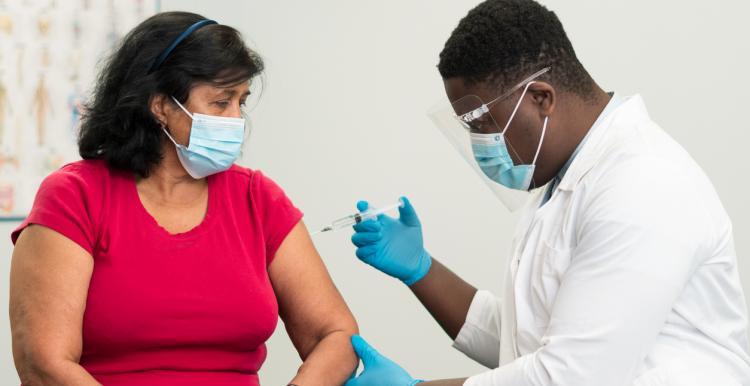Covid-19 Vaccine Round-Up: Access, Attitudes and Experiences

The UK’s COVID-19 vaccine roll-out has been the most significant public health exercise in recent history.
While the roll-out has been an incredible achievement, Healthwatch England wanted to understand if everyone could access the vaccine equally and if their experiences of getting it were the same.
To find out, they carried out two national surveys to hear your views and experiences of the Covid-19 vaccine. Thanks to your feedback, they were able to share with the Government and the NHS how the roll-out has been working.
Where does Healthwatch England's evidence come from?
- Between March and April 2021, 2,249 people responded to their first survey about people’s attitudes to the vaccine.
- Between April and May 2021, 1,850 people responded to their second survey about people’s experiences of the vaccine roll-out.
Attitudes to the Covid-19 vaccine
People want to get the vaccine to protect themselves, their family and their friends against getting Covid-19.
Most of the people who shared their feedback had already received their vaccine (83%), with a further six per cent saying they definitely or probably would get it.
However, one in ten people told them they would definitely or probably not receive the Covid-19 vaccine. They gave multiple reasons for this, including:
- Not trusting the intention behind it.
- Not thinking the vaccine is safe.
- Not believing Covid-19 posed enough risk to them.
These survey respondents also felt either fairly or very negatively towards vaccines in general (41%).
“I’ve already had COVID-19, so why do I need the vaccine as I have already got the necessary antibodies?”
– Man, White, 50-64 years.
They also asked people who had only had their first dose of the vaccine if they had any concerns about their second appointment. Nearly a quarter of these respondents did, particularly around potential side effects of the vaccine and the potential risk of blood clotting that the news was reporting.
Vaccine confidence in people from African, Bangladeshi, Caribbean and Pakistani backgrounds
While overall attitudes are mainly positive, Healthwatch England identified lower vaccine confidence among particular ethnic communities. To find out more, they conducted research exploring this with people from African, Bangladeshi, Caribbean and Pakistani backgrounds living in England.
Their research participants told them agency, independence, transparency, and real-world experience of the vaccine was vital in improving people’s confidence.
People’s experience of the Covid-19 vaccine
Whether people had received both doses of the vaccine or one, most had a positive experience of their appointment.
Only five per cent of people experienced difficulties booking or attending their appointment. The most common challenges they faced were using the online or telephone booking systems, booking somewhere close to home and getting there.
Disabled people also said that the setup at vaccine centres did not always support them properly — for example, people who find it challenging to stand had to queue for a long time. Similarly, people who use wheelchairs could not get into vaccine centres, and there were reports of limited disabled parking at some venues.
"Being disabled, I had trouble queuing outside because of the cold, a lady did come out when she saw the queue and take me in the tent to wait my turn there."
- Woman, 65-79 years.
What next?
It is essential to recognise the successes of the vaccine roll-out to date while also mitigating any problems that could arise; this includes:
- Understanding and addressing the reasons for lower vaccine confidence in specific communities.
- Ensuring appointments are accessible to everyone.
- Communicating information about second doses clearly and promptly ensures that as many people as possible receive both doses.


